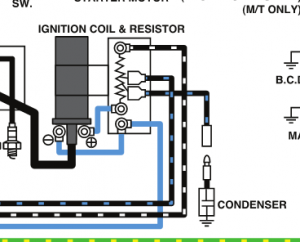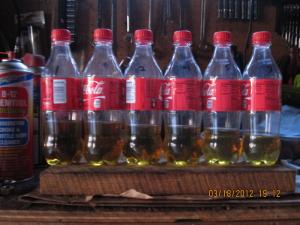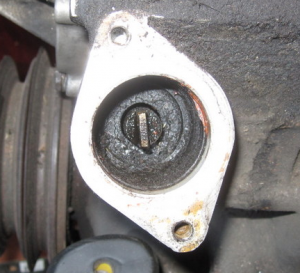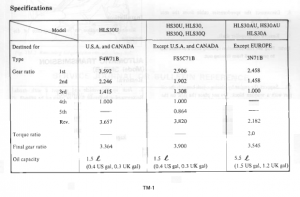Everything posted by Zed Head
-
Injector Leaking.
Cups with polystyrene blends might hold up fine. Pour a little in and see. I was just offering some advice to avoid a melted mess of plastic gasoline on top of your engine if you got the wrong cups.
-
Need Help With Timing!
You should call him so that he can make things right for the next guy.
-
Msd 6Al Wiring Help Please.
All Z's should have those wires at the ballast resistor location. Here's an example for 1976. One is black with white stripe, the other is back with blue. Your year may have different colors.
-
Shock Tower Brace
On the back, running a brace from each tower up the roof might offer the benefits of a roll cage. You can go nuts thinking of all the places that might be braced better. Some one on another forum even noted that their car had better, stiffer handling, when they glued the windhshield in. And there are some that say the car gets flimsy when the floor panels are removed, implying that much load is handled there, they're not inert. So bracing the floor panel somehow should help. And rusty floor panels would be bad.
-
77 Z Drives For About 10 To 15 Minutes,then Dies.
Sometimes the tachometer needle starts acting weird when the module is going bad, also. And the needle will go to zero right away if spark stops and you're coasting in gear, whereas it will still show RPM if you're coasting in gear and it's a fuel problem. Just a clue to look for while you're in the driver's seat.
-
Injector Leaking.
Coke bottles work well too. Be careful on the cups, polystyrene will dissolve (edited from melt) in gasoline. Best test first. I had issues with the first set of injectors on my car also. They were mismatched brands, and a couple looked well-worn, so I just replaced them with new.
-
Need Help With Timing!
Make sure that you're actually on the compression/firing stroke before you go too far. Mistakes happen, but it would be a surprise if Rebello made one. Your TDC marks will align two times per cycle, once on the firing stroke and once on the exhaust stroke. The distributor will show 180 off like yours, on the exhaust stroke.
-
Need Help With Timing!
Since it's exactly 180 degrees off, the wire swapping should work fine, except that the length of the wires may be tight on some terminals. Curious - Did Rebello install the pump and quill? Mistakes happen.
-
Injector Leaking.
You could run any jumper wire from the coil center terminal directly to ground. No need for a spark to happen, the ECU will still gets its on-off signal from current flow. I agree it's a good way to protect the module, I'm pretty sure I damaged one of my own by leaving two plug wires off after doing some work one day. Don't know if it was the lack of a path or a stray spark but the module definitely was weaker afterward. Had to replace it.
-
Need Help With Timing!
Looks like your moon halves are swapped. Little for big. I think that means you could move your plug wires ahead three holes each and be on track, with a mystery for a future owner. Or you can drop the oil pump and relocate the shaft. Added a picture of mine from a fine-running engine at TDC on the firing stroke. Diseazd makes a good point about firing stroke. Cam lobes up on #1. Can't tell from your picture. Cam timing can also cause problems. If you take the valve cover off, check the notch and groove.
-
Injector Leaking.
You could wire it up and make the final power connection last. I make individual connector pins by pounding a piece of solid copper wire flat. Sticks right in there, converting female to male. Then I use alligator clips. Does take a little extra care though and can make you nervous. If you're just looking for leaks, then pressurizing the rail and injectors would work. If your FPR and pump check valve are working the rail will hold pressure and you only need to run the pump for second or two. I diagnosed a neighbor's injector with shop air. Even with a leak there was enough leftover fuel sitting in it to get pushed out. The body was cracked and it leaked externally. It was an old Porsche injector, that apparently is known for doing that and burning up cars.
-
Injector Leaking.
They would only spray at every third spark. And you probably don't want external sparks while you're spraying fuel, so messing with the coil and ignition would not be an option. Another way to do it would be to run a jumper to ground from every injector pin at the ECU connector. With the key on there should be power to the injectors, grounding them like the ECU would do should open them up. Run the grounds, turn the key on, the injectors open, open the AFM flap and the pump makes them spray. I have not tried this but it should work. Are you looking for spray pattern or do you want to measure output? Because the spray pattern of the stock Datsun injectors is essentially a thin stream. If you're using Bosch injectors, you'll get more of a mist. If you just want to check for leaks, then the AFM-flap method would run the pump and pressurize the rail.
-
Shock Tower Brace
Figuring out how the loads get distributed can be hard to do. Under lateral loads, like cornering, you could imagine that the highest loads are at the two inner attachment points of the control arm (transverse link in Datsun-speak), Which transfers in to the links that drop down from the body, and the diff mount/crossmember. The top of the strut only sees the weight of the car, essentially, as you describe, in-line. At first glance, it looks like the tops of the towers are important load-transfer points of a triangular structure. But because of the shocks and springs, and the flexible hinge at the hub, they really only see changes in "weight" of the car. It's interesting to look at because you can imagine a much weaker strut tube than is used. The double wall nature of the strut tube with a shock tube inside is really much stronger than it needs to be. So it leaves up-and-down as the force at the top of the tower, coming from the suspension. Which should really only be unusually high if you bottom out the shocks. So, in travelling over uneven bumps like a driveway entrance, you're probably really combating flex from twisting of the whole metal box/body. Which seems to me like it would a blend of fore and aft, and lateral, a diagonal flex. My 280 creaks the most when a front and rear wheel on opposite sides (diagonal) are unloaded at the same time. Like a driveway entrance. That's just one pass through the brain. Something new pops up every time I think about it.
-
Shock Tower Brace
This gets discussed quite a bit on various forums. To John C's point, the towers are already braced for lateral motion,under the vinyl. To Mark M's point, maybe bracing forward and backward (what a roll cage would do in addition to lateral) would be more helpful. Also, the 240Z is known to be flimsier than the 280Z so what helps on a 240 may not help so much on a 280. The use as a cargo barrier/holder though has obvious value. Maybe that's enough. It may also help in an accident, basically inert metal until needed. From what I've picked up, if I remember right, a triangular brace from the firewall to the front towers is the simplest bolt-on brace that you can add. It addresses fore and aft, and lateral, motion. Here's an example - http://www.racetep.com/zfront.html
-
Identifying 5 Speeds.1)
Did you mean 280ZX 3.9 long-nose? That's the typical diff for the 280ZX. The 300ZX NA's came with 3.7, typical, and have a different flange pattern. More work, to swap the flange so a 280Z or 240Z propeller shaft can be used.
-
Rear Engine Plate Difference.
My understanding is that the main difference, and maybe the only one, is that the bottom portion of the automatic plate is removable so that the torque converter bolts can be installed and torqued. The plate is actually just a dust and water shield so that makes sense.
-
Seat foam
They're called "hog-rings" and they're the stiff pieces of wire crimped around the edges of the material and the wires and the springs to hold everything in place. Search hog-ring on the net and you'll find a bunch. They were/are crimped in to the noses of hogs so that they can be controlled. Actually, (edit, I'd forgotten) so they don't root around. They make different sizes for different noses, from little piggies to big hogs. How to ring a pig's nose (noise alert!) -
-
Identifying 5 Speeds.1)
Actually, I was kind of lazy in my response. The ratios are listed for the 5 speed in the FSM. 5th is not direct. The "mysterious" 5 speed I was referring to is commonly called the direct-drive 5 speed dogleg "comp" box. Comp for competition. I think it was an option from Nissan at some time. Anyway, even if there was a list of codes for the transmissions, with the interchangeable parts you'd still have to do some calculations or open it up to know what you had. From the 1972 FSM. Note that the ratios do seem backward, compared to the ratios of the transmissions. The 5 speed needs the 3.9, and the 4 speed, the 3.36.
-
Identifying 5 Speeds.1)
Is this the mysterious "dogleg" 5 speed, that sometimes has a flange on the output shaft? 1:1 (direct) 5th gear?
-
Rocker Geometry Woes
Kameari has a solution to avoid the little click, but their product is a little pricey. A handy person could probably copy the concept to modify the stock parts. http://www.kameariusa.com/l6-adjustable-timing-chain-tensioner/
-
Rocker Geometry Woes
Man, I really appreciate the way you keep going once you get started. I've had a few start at 10 am, WTF it's 1 am days myself. I hate to leave things undone. I didn't even know about the "little click" until now.
-
Sitting Uneven
How about some of these - http://www.traxxion.com/Shock-Spring-Torrington-Bearing-Kit-by-Traxxion-Dynamics-0/ I don't think the people that designed the urethane bushings put a ton of design effort in to them. They're just stiffer and cheaper than the stock rubber parts. Same durometer urethane compound, a bunch of different shaped molds. Easy money.
-
The Seven Words You Can't Say On Classiczcars.com
Assistant associate watercock ****-a-doodle-doo Dickinson damnation Edited out a word - just in case. Although it looks like the software completely removes/changes the word once you save the post. Gone forever. Edit - looks like he's working on it. Sorry for the last word Mike, I was ready to edit it out.
-
Identifying 5 Speeds.1)
Many people have tried to correlate the numbers on the transmissions with some basic qualities of the unit. But there doesn't seem to be any correlation, even though there are Nissan documents that show where the numbers are. But no charts indicating what the numbers mean. A 300ZX 5 speed will not fit correctly because the VG30E (V6) engine used a tilted bolt pattern. It will bolt up but it the shift lever will be at an angle.
-
1976 280Z Restoration Project
The bolt patterns and centering/locating ring sizes are the same for the 240Z - 280ZX NA cars (non-FS5R90A transmission). Sometimes there is confusion about square versus round flanges but Nissan made both with the same pattern and size for the 280Z's. I have one of each. I also have differentials from 1976 up to 1983. I have a 1983 diff in my 1976 car with 1980 NA transmission right now, with a 1978 propeller shaft.The shape of the flange does NOT indicate the pattern and locating ring size. 300ZX's are different size but came with a square flange also. On the length: the propeller shaft lengths are shown in the PD (Propeller shaft and differential) chapters of the FSM's. I'd use those numbers over anybody's well-intentioned efforts with a tape measure. But for the cost of shortening a 280ZX propeller shaft you could probably find a 280Z shaft somewhere. Maybe even two or three. They last a long time.








